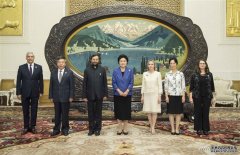China Focus: Open-minded or forced? Chinese graduates go slo
BEIJING, Aug. 21 (Xinhua) -- The future is not so bright. Almost eight million fresh college graduates are looking for jobs in China this year, a new high in recent years. But many do not seem to care much whether they find one or not.
They are devotees of "slow employment", sort of a trendy lifestyle that advocates a not-so-fast attitude in finding a job after graduation.
Some, like Xia Chuanqi, 24, planned for it. After bidding farewell to campus life in Sichuan College of Culture and Arts in July, Xia went to Bazhou in northeast Sichuan Province and became a volunteer. He had no idea how long he would stay, but only knew he wanted to be there.
"I interned at a local TV station in college and had been to several impoverished places in remote Sichuan. There, I saw people in need of help and that image stayed in my head. I come from the countryside, and I want to give them a hand and pull them up," he said.
Majoring in performing arts, many of Xia's classmates went off to seek fame and fortune in the megacities, dreaming of overnight success. Xia is quite clear about how unlikely that would be.
"Many actors lack real life experiences, so I want to do something down to earth and become a better person. Even if I decide not to become an actor, these experiences will stand me in good stead and will do me good," he said.
Xia speaks with a certain amount of authority. He seems like a person who already knows himself quite well.
"I have no idea of what my future holds, but first and foremost, I want to be a man with a sense of social responsibility," he said.
THE JOYS OF PRIVILEGE
While Xia is assertive and determined, a young lady, only willing to be identified as Xu, from the Communications University of China, has also taken her time to find a job, but for a different reason entirely : she is picky.
The 25 year-old took several job interviews, but none of the opportunities met her exacting standards. She insists on a job she will enjoy, and she wants to be well paid for her efforts.
Regardless of her opinion about the jobs in question she failed several interviews, and returned home to Shandong Province with her tail between her legs, idling away half a year before she was eventually hired by a training agency in Beijing.
"It is easy to find a job, but hard to get a good one," said fresh graduate Huang Xiaoqian. Huang spent three months looking for a job in Chengdu, Sichuan's capital, after months of searching in Beijing, where she graduated.
"Slow employment" is the outcome of social progress and better-off families. In the old days, fresh graduates would kill or die for a job simply because, if not, they would have no money to survive. Now, many mollycoddled young people no longer carry such economic burdens. Parents are ready and willing to finance their kids as long as they need money.
At the same time, society is no longer judging success only through one's occupation and income, and technology has reshuffled the employment structure in China.
"Traditional jobs no longer hold the same appeal. There are much more choices now -- opening a Taobao shop, becoming an overseas purchasing agent, doing live streaming -- but these are not deemed 'real' jobs with a stable monthly income and therefore are not included in the so-called 'employed population,'" said Yan Su, professor at Zhejiang Sci-Tech University.
"Slow employment is most common among students whose families have enough money to allow it. They want to have more alternatives and richer experiences," said Wang Lei, a law professor at Peking University. "But they should not wait too long or it may have the opposite effect."
TIME TO GROW UP
The new phenomenon also exposes a bigger picture of the gap between education and reality.
In 2016, research company MyCOS showed that students from three of the most popular majors in China - economics, business administration and literature - faced most difficulties in finding jobs. In contrast, students studying history, water conservation, energy and architecture got offers much more easily - not exactly what you might expect.
"We should be aware of the problem behind 'slow employment.' The majors in many colleges and universities are outdated and do not match market needs," said Wei Qi, professor with Xi'an University.
"Schools should reassess their majors, update their courses, and pay more attention to practical skills rather than pure theory," Wei added.
Wang Zhifang worked at a well-known company for years after graduation before starting her own business several years ago. Her own experience has convinced her that under the current education system, fresh graduates need time to plan their careers before jumping into a major commitment to a company.
"Gap years are normal overseas. They spent their time traveling, doing community work and internships, as a way of expanding their horizons," she said.
"While I was at school, I had no plan for my future and made the same decision as the majority of my peers. But I soon regretted it. It would have been much better if I had not been in such a rush and thought it through."















